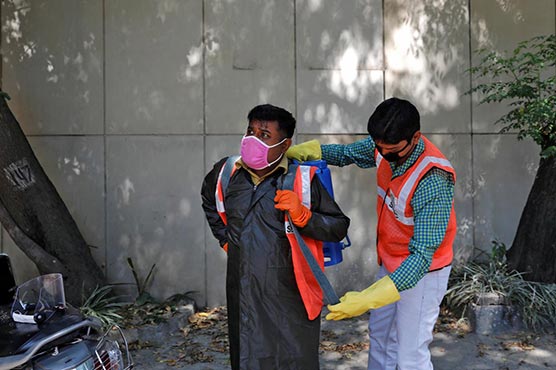'I do feel afraid': Indian workers disinfect coronavirus hotspots

'I do feel afraid': Indian workers disinfect coronavirus hotspots
NEW DELHI (Reuters) - One recent morning in his two-room New Delhi home, sanitation worker Dev Dutt Sharma drank tea before putting on an orange jacket and bidding goodbye to his two sons, wife, and elderly mother.
He rode his motorbike to government offices in South Delhi, where he suited up in protective gear and strapped a container full of disinfectant on his back.
Then he ventured out to disinfect some of Delhi’s crowded slums and neighborhoods deemed at risk from the coronavirus, which has infected more than 20,000 people and killed 652 in India.
“I do feel afraid, because I have a family,” said Sharma, 38, who is one of more than 3,500 workers usually tasked with combating malaria for the South Delhi Municipal Corporation.
“But then I think that, along with my own family, I will also save other families.”
The plight of India’s under-protected medical workers has drawn widespread attention, but workers disinfecting cities are also at risk as they venture into designated containment zones.
“Wherever we get more than three or four cases from a single locality, we are taking special measures in those areas,” said N.R. Tuli, a doctor in charge of disinfections in a South Delhi area.
Such measures boost sanitation and strengthen awareness of government actions, said virologist Shahid Jameel.
“The latter increases the level of trust that is so important for people to follow instructions,” added Jameel, the chief executive of health charity the Wellcome Trust/DBT India Alliance.
India’s population of 1.3 billion has been subjected to one of the world’s toughest lockdowns, confining people to their homes except for trips to buy food and medicine until May 3.
To help rein in the virus, Sharma disinfects as many as 80 homes a day. But when the work ends, anxiety returns to haunt him.
“When I come back home, I also feel, ‘What if this virus is inside me and might get transmitted to my children?’,” he said. “But we are helpless, we have to perform our duty.”

